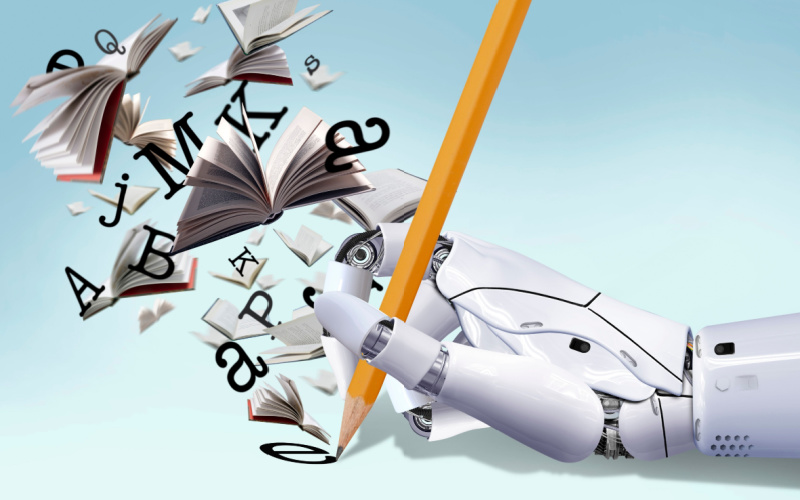From automating mundane tasks to creating hyper-personalised experiences, AI is leaving a mark on every pixel and click. But what does this mean for the future of digital marketing, and how can digital marketers, content creators and creative designers, leverage this evolving technology responsibly?

The canvas of possibilities with AI is constantly expanding. Imagine waving a magic wand and eliminating repetitive tasks like audience segmentation, data analysis, and ad optimisation. AI is the productivity genie in a bottle. Leading digital marketing expert, Stephanie Sprayregen, Founder of Spray Marketing, comments, “AI is helping to automate a lot of remedial day-to-day tasks that enable marketers to focus on strategy and implementation, which in turn leads to better outputs for performance”.
“An example of this would be utilising AI for audience segmentation where it can identify and group user characters together to create an ideal buyer persona for clients, as well as being the starting point for creative ideation. It can help streamline work produced with AI chatbots for customer support/retention strategies, to providing predictive analytics for proactive performance marketing initiatives.”
Adapting to a new era
To leverage the power of AI, digital marketing and design teams need a diverse skillset that blends human strengths with the power of technology. While AI automates tasks and unlocks data-driven insights, it doesn’t replace the need for human creativity, strategic thinking, and emotional intelligence. Sprayregen observes, “There’s a new level of skills needed to adopt AI technology in the digital marketing space, particularly when it comes to creative content. Finding prospective creative employees who know how to use AI art generators like MidJourney or Adobe’s AI Photoshop is a huge plus because it can help save on production and design costs”.
AI is a tool, not a replacement. Digital marketing teams that develop complementary skillsets, leveraging both human and AI capabilities, will be at the forefront of success in the ever-evolving digital landscape. Sprayregen recommends, “Trying out different AI tools and technology to understand what works for your workflows and what doesn’t is more important than ever. Embrace lifelong learning and upskill in data analysis, critical thinking, and AI literacy.
AI, human, or both? Assigning the right task
Humans excel at understanding the “why” behind trends and client challenges, using AI data to make informed strategic decisions. Sprayregen says, “AI is still too fragmented and in its infancy stage. Marketing strategies require an understanding of human emotions and sentiments, the “why” in consumer behaviour trends, and the challenges faced by brands, outside of numbers and statistics. AI algorithms are good for problems with a clear end solution”.
Crafting compelling narratives and branding that resonate with target audiences remains a core human strength, even with AI-assisted content creation. AI can churn out a multitude of logo variations based on keywords and brand attributes, speeding up the initial ideation process. However, human expertise is still crucial in refining, ensuring brand alignment, and injecting soul into the design.
AI can also generate personalised marketing materials like brochures and social media posts, catering to specific demographics. However, the risk of bland, generic content requires human oversight and a focus on brand voice.
Don’t rely too much on the machines!
AI is incredibly efficient, but overreliance breeds laziness. Imagine copywriters relying solely on AI for content creation, sacrificing authenticity for convenience. This is a pitfall to avoid. Striking a balance between automation and human touch is key.
“It’s incredibly important that marketers don’t overuse AI because it can promote a level of laziness that can lead to inauthentic work. For example, I could see copywriters using AI to brainstorm new concepts and engaging social posts, to then one day relying on AI, not just for ideation, but for fully writing entire content pieces for them. I think AI can potentially breed laziness in the workforce, misplacing it for working smarter, not harder”.
Be ethical and responsible
Cultural sensitivities and discrimination are major ethical concerns. Digital marketers need to be hyper-aware of potential biases in AI algorithms and data sources. They must be transparent about how AI is used in their campaigns, clearly explaining its role and providing users with control over their data.They must actively mitigate bias in algorithms and data sources, ensuring our AI does not discriminate against any individual or group.
Sprayregen advises, “Clearly define your brand voice and values. Ensure human oversight and curation of AI-generated content. Focus on storytelling and emotional connection, leveraging AI for efficiency but relying on human creativity to craft messages that resonate”.
Will AI replace us?
It’s impossible to predict the future, but AI replacing entire digital marketing jobs seems unlikely. AI acts as a first line of defense, analysing data, predicting outcomes, and assisting with ideation and customer support. However, humans remain essential for finishing the job and adding the human touch. Sprayregen says, “Never say never. I don’t want to see a future where it replaces digital marketing jobs, and I also am not going to say I know exactly where AI is headed because every day it’s evolving”.
“However”, adds Sprayregen, “I do believe that AI will continue to be a part of digital marketing ops as their first line of defense—meaning using AI to help analyse data or predict outcomes and using AI to help with ideation and customer support, but currently AI has its limitations where humans need to take the lead in finishing the job”.
AI is revolutionising digital marketing, acting as a powerful tool for efficiency and insights. However, it’s not a replacement for human creativity, strategic thinking, and emotional intelligence.

